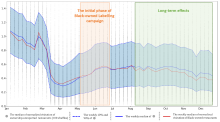During the first year of the pandemic, and amid protests for racial justice following the murder of George Floyd, tech companies such as Google, Yelp and DoorDash started “Black-owned” labelling campaigns to encourage customer support for restaurants and other businesses.
But new research, using cellphone location data, shows that visits to restaurants that identify as Black-owned, compared to those without a label, dropped off after some initial spikes and were inconsistent across 20 U.S cities.
Authors of the study, led by the University of Washington, say the findings raise questions about the effectiveness of such a labeling campaign, and how tech companies and even local governments could better support communities of color, whether through such programs or other means.
“Big tech plays an increasingly influential role in almost every aspect of our everyday life, especially in today’s economic recovery, and the Black-owned labelling campaign appears to be well-intended,” said Bo Zhao, an associate professor of geography at the UW who led the study through his Humanistic GIS Lab. “But what have been the consequences? As allyship to minorities has become a core value of our time, how can big tech become a better and more inclusive ally? This research provides a timely case study...”
... The study was funded by the Department of Geography Research Fund at the University of Washington. Additional co-authors were Xiaoqi Bao, a graduate student in the UW Department of Geography; Shaozeng Zhang of Oregon State University; and Zhenlong Li at the University of South Carolina.
